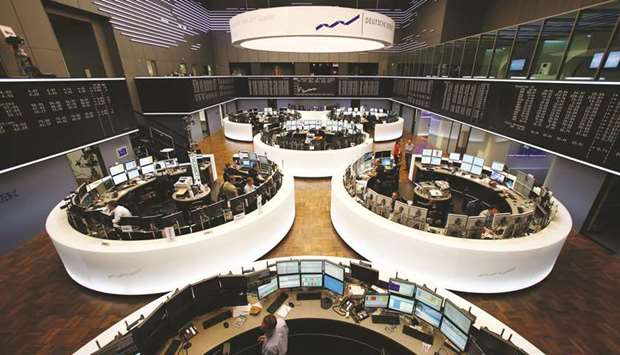European shares closed higher yesterday, marking weekly gains as investors focused on a broadly supportive earnings season and improving economic data in Europe rather than rising US-China tensions.
In London, the FTSE 100 closed up less than 0.1% to 6,032.18 points; Frankfurt — DAX 30 ended up 0.7% to 12,674.88 points; Paris — CAC 40 closed up less than 0.1% to 4,889.52 points and EURO STOXX 50 closed up 0.2% to 3,247.81 points yesterday.
The main indexes spent the morning in the red after US President Donald Trump moved to ban US transactions with the Chinese owners of messaging app WeChat and video-sharing app TikTok, further escalating friction with Beijing.
Amsterdam-listed Prosus, with its biggest investment in Tencent, fell 4.0%.
Markets, however, stabilised later, boosted by telecoms, technology and healthcare stocks.
The pan-European STOXX 600 index, up 0.3%, closed out with weekly gains of 2%. German stocks rose 0.7%, while London’s FTSE 100 and France’s CAC 40 were flat, but all logged weekly rises.
With the bulk of the European earnings season over, investors were relieved that most companies had exceeded analysts’ much-lowered forecasts for quarterly profits.
Refinitiv data showed about 60% of the STOXX companies that have reported so far beat estimates.
Hikma Pharmaceuticals jumped 10.9% after saying it had started manufacturing remdesivir, an approved treatment for Covid-19 from US-based Gilead, and it raised its annual sales outlook for two of its biggest divisions.
Deutsche Telekom, which owns 43% of T-Mobile, rose 2.7% after the US firm added more monthly subscribers than expected in the second quarter and said it surpassed rival AT&T.
The broader telecoms index rose 1% to lead sectoral gains, although stocks considered more sensitive to business cycles, including banks, miners and oil and gas companies, handed back some of this week’s steady gains.
Standard Life Aberdeen’s shares inched higher after the asset manager said it would pay a dividend even as its profit dropped 30%.
Wall Street brushed off data released yesterday showing the US economy adding jobs as US-Chinese tensions mount and a standoff over fresh stimulus continues.
The monthly US non-farm payrolls market report had been eagerly awaited as the first important indication of how a recent surge in infections that has sparked a second round of business closures has affected the economy.
The report showed that the US economy added 1.8mn jobs in July, far fewer than in May and June, but more than economists had been expecting.
Meanwhile the unemployment rate fell to 10.2% from 11.1%, also better than consensus expectations.
However that still leaves the unemployment rate at slightly worse than the depth of the global financial crisis in October 2009 and less than half the 22mn payroll jobs lost during the pandemic have been regained.
The employment report “can fairly be labelled better than feared,” said Briefing.com analyst Patrick J O’Hare.
“The key takeaway from the report is that the labour market is recovering from the shock of the Covid-induced seizure, but still has a long way to go,” he added.
Other analysts put a more negative spin on the report.
“The non-farm payroll report confirmed economic data is plateauing and that the third quarter rebound everyone expected is not happening,” said Edward Moya at online currency trading firm Oanda.
For David Madden at CMC Markets UK, “now that the jobs report is out of the way, dealers will turn their attention back to China, and the squabbling over the coronavirus stimulus plan at home.”
Wall Street opened lower and the three main indices remained there approaching midday.
They followed Asian stock markets which had moved down on a new China-US political flare-up after President Donald Trump signed an executive order barring US residents from doing any business with the Chinese parent companies of social media platforms TikTok and WeChat, citing national security concerns.
The move, which comes into force next month, is the latest salvo in a tech stand-off between the superpowers and adds to a laundry list of issues they have butted heads over in recent months, including Hong Kong, Huawei and the coronavirus.
“The US government is expected to follow up with more measures targeting Tencent,” said Steven Leung, at UOB Kay Hian.
The latest tensions overshadowed data showing a surprise jump in Chinese exports for July.
The mood on Wall Street has also been soured by US lawmakers’ slow negotiations on new economic stimulus against a backdrop of surging virus infections.
The United States has seen a major coronavirus resurgence since the end of June, adding 2,060 deaths in 24 hours alone Thursday, data compiled by Johns Hopkins University showed.
Meanwhile, the dollar, which has weakened in recent weeks on US economic concerns resulting in record-highs for haven investment gold above $2,000 an ounce, rebounded.

Traders monitor data on computer screens at the Frankfurt Stock Exchange. The DAX 30 closed up 0.7% to 12,674.88 points yesterday.
